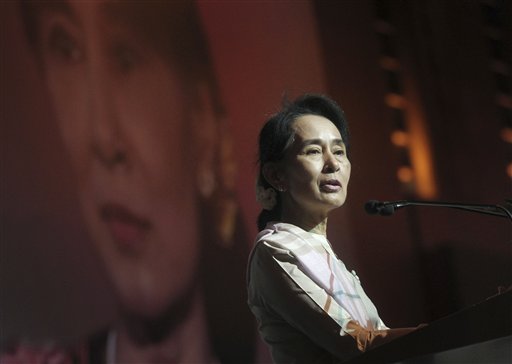A recent meeting of political party leaders to discuss a framework for post-ceasefire dialogue was carried out without Burma’s two biggest parties, giving rise to theories that past rivalries are resurfacing.
The ruling Union Solidarity and Development Party (USDP) and the main opposition party, the National League for Democracy (NLD), were not among the 52 political parties represented at a conference held in Rangoon from 13-14 September. An ethnic political coalition closely allied with the NLD, the United Nationalities Alliance (UNA), was also absent.
A senior NLD official told DVB on Monday that the party was not formally invited, contrary to the organisers’ claims that they were.
“Firstly, we did not receive an invitation to the event,” said NLD Central Executive Committee member Tun Tun Shein. “We learnt from news journals that it was being hosted at Green Hill [Hotel], but it wasn’t clear who was organising the event, whether it was the NDF [National Democratic Force] or the NBF [Nationalities Brotherhood Federation].”
He said that because they had received only secondary and partial information about the event, the NLD opted not to attend.
Pu Zo Zam, chairman of the Chin National Party and spokesperson for the NBF — an ethnic alliance that co-hosted the event with the NDF — said that he was under the impression that the NLD was among the invitees.
“The NDF said that they sent out invitations, but it is not within our right to investigate whether this is true or not. We instructed the organisers to invite everyone to the event,” he said, adding that the NDF was the main organiser of the event while the NBF provided most of the expenses.
“My assumption is that the ruling party [USDP] may have their own plan for the political framework since they are the government, so there was no need for them to work with us,” he said. “As for the NLD and the UNA, we are working on a framework but we welcome them to draft one of their own.”
[related]
The conference concluded with an agreement to form a 15-member committee to draft a framework proposal. As a nationwide ceasefire agreement nears, politicians have complained of being excluded from the peace process, which has primarily been carried out by the government’s peace negotiators, the Union Peace-making Work Committee (UPWC), and their counterpart, the Nationwide Ceasefire Coordination Team (NCCT).
The UPWC invited politicians for a briefing on the peace process in mid-August 2014. Tripartite political dialogue is expected to begin within 90 days of reaching a nationwide ceasefire agreement.
As politicians scramble to prepare their version of a framework for carrying out political dialogue, some said that the exclusion of the NLD reveals a growing divide among the nation’s opposition policymakers.
Aye Maung, chairman of the Arakan National Party, said that the apparent sidelining can be traced back to old bitterness between the NLD and and the NDF, which was originally a splinter group established by former NLD members who left the party to contest the 2010 elections.
“In my opinion, this is similar to the situation between the east and the west blocs of the cold war era,” he said. “Here we have a bloc of parties that participated in the 2010 elections, and a bloc that was established during the 1990 general elections. The 2010 bloc are generally regarded as closer to the USDP.”



